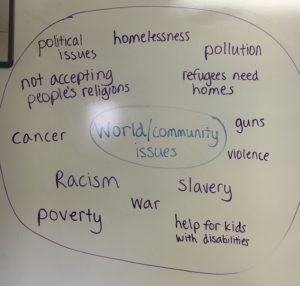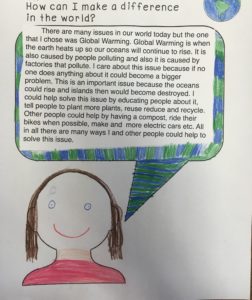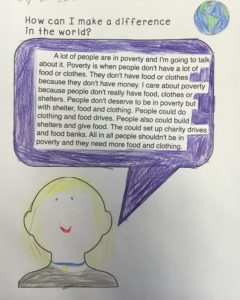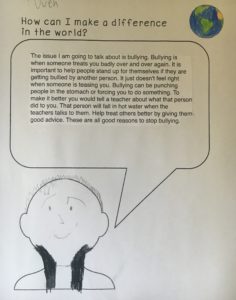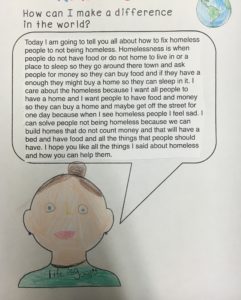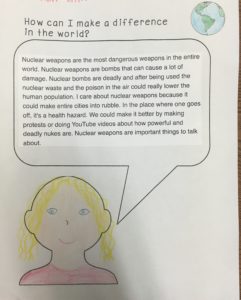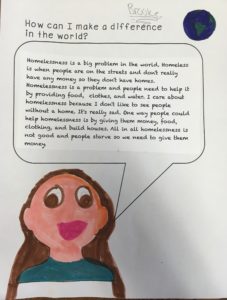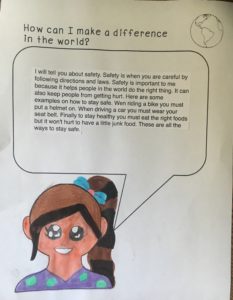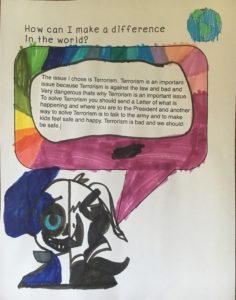[Ed. note: I wrote this a week ago and immediately got stuck in anxiety about posting it. Vulnerability is hard, and it’s scary to imagine how people might feel or react, even when deep in your heart you know that you’re just telling your story. And even if you’re a person who preaches being brave, it doesn’t mean it’s always easy. It’s terrifying. But here’s the thing: vulnerability brings healing, to yourself and to others. And also, there’s this, that was a perfectly-timed reminder (thank you, Laura):

So with that: press publish. Vulnerability is bravery is healing.]
When people are surrounded by something all the time, they naturally become an expert on it. Sometimes that can cloud their perspective – they forget that not everyone else knows everything that they know.
My brother probably forgets that even the basics of coding are not necessarily common sense. My husband might occasionally have to remind himself that not everyone knows the basics of what our healthcare system involves. I live autism and language/learning disabilities day in and day out, and have for years. Invariably, each year when “Autism Awareness” circulates, I find myself thinking, “really? But we all KNOW about autism.” Well, I do. And my coworkers do. And the colleagues and contacts I follow on social media do. But everyone? No, they don’t.
This is all normal. We live and breathe something and so to us it becomes obvious.
People who don’t deal with anxiety might not know what it’s like for someone to experience it (which is a large part of why I write about it – education, and to reduce stigma, and encourage bravery). The same can be said with trauma. It occurred to me recently that I write a lot, in great detail, about anxiety. And the response is always overwhelmingly positive, from the texts and messages and emails that I receive. But while I’ve certainly acknowledged trauma in posts, I actually haven’t written that much about it. Part of that is I didn’t feel a need. Part of that is I didn’t know where to begin. Part of that was, quite honestly, fear – because while I know most people would have a positive reaction, I also know that not everyone else would. And I talk about facing fears and being real and being brave, but oh, it can be scary and hard.
Anyway. One day last week on my drive home from work, I was thinking about a conversation I had had with a friend who was experiencing a recurrence of a PTSD symptom. Particularly, I was thinking about how most of us experience(d) symptoms, but they aren’t necessarily talked about. And so, just as with autism or coding or healthcare, other people just don’t know. And how could we expect people to support us, advocate for us, be our cheerleaders, if they don’t know what we experience?
So I decided to start here, in the mixed-up middle, because that’s always the best place to start.
People hear about PTSD and might think of flashbacks, of a soldier hearing a loud noise and bolting under the table, thinking he’s back in Afghanistan. Flashbacks are real, and they certainly exist for sexual trauma as well. I have heard from many survivors that flashbacks are the hardest symptom. For me? One of the hardest parts was what I call body memories.
The best way I can explain this is, have you heard of phantom limb pain? How someone can have their leg amputated, and cognitively know their leg isn’t there, but they feel it, and it hurts? Body memories for me were like that. I would get a feeling being touched, being invaded, and I would feel it in my body as if it was happening. It wasn’t a flashback. I knew exactly where I was, I wasn’t dissociating or losing time, I was going about my day. But while my brain was very present in the here and now, my body was stuck in the past.
Certain touches, or even smells or places, or memories would trigger it – but sometimes it would happen from nothing at all. Let me tell you – it is a very hard thing to be at work, smiling and confidently working with students, but inside have your skin be crawling with sensation.
I draw attention to body memories because they happen. And they are often invisible. In college sometimes they’d leave me curled up under blankets in bed, but over the years they became quite functional. You’d never know it was happening unless I told you.
Which is why I’m telling you.
(For the record – they happen much less frequently now, fairly rarely. And when they do, they don’t last for days and weeks on end. And they don’t paralyze me the way they used to. (A lot of which I attribute to not hiding my stories as shameful secrets anymore). But as with anything, they could come back. Things come and go in waves. The difference is, as I said to my friend, it’s no longer like falling off a cliff and shattering into a million pieces. It’s more being a strong tree, rooted in the ground, during a storm. You’ll sway and bend, but you won’t break, you won’t uproot, you won’t shatter, you won’t die. You will survive. )
And I’ll end this right here, in the middle, too. Because there will be more to come. There needs to be, you know? Nobody should have to suffer in silence. Nobody should feel that people don’t get it, and so therefore they can’t talk about it.
Next time you’re at work and someone acts “off” – maybe their brain is stuck in a memory. Maybe their skin is crawling. Maybe not, but statistically? It very well could be. So smile at them and send them love and compassion. They will feel that you’re a safe person, and maybe that’s all it’ll take for them to talk, to let it out. That’s how it happened for me and I am grateful every single day for those people who became my safe harbor, who helped me become that tree rooted down in the ground, who helped me know that I. will. not. break.


